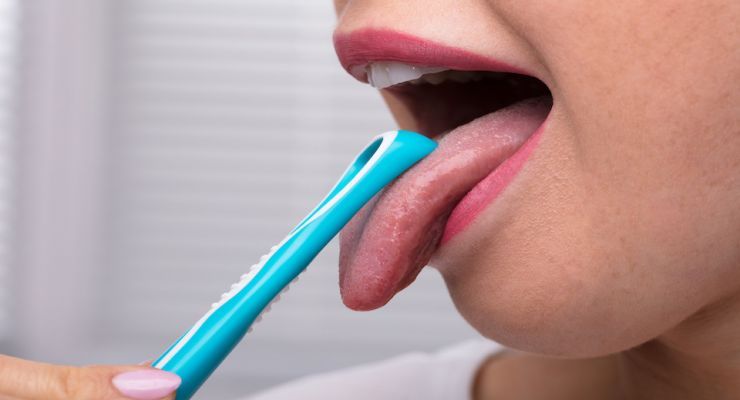You’ve most likely heard of the tongue scraping craze. Dramatic before and after pictures of people scraping off piles of nasty goop from their tongues has probably led you to do some research regarding this most recent trend. But is it really as good as they say? Here are four researched backed reasons to scrape your tongue and other good habits for a clean and healthy mouth.
What is tongue scraping?
Tongue scraping is an effective way to remove bacteria buildup and debris from your tongue using a curved plastic or metal tool specifically designed for this very purpose. And it’s not actually a new idea; people have been swearing by the tongue scraper for decades to banish bad breath and improve oral health. It is only in recent years that it has risen to the attention of the masses. The tongue scraper is used in conjunction with regular brushing and flossing to get rid of anything that escaped the attention of your toothbrush.
So what is it good for?
Improve the appearance of your tongue
Over time, your tongue can collect a buildup of bacteria and debris that forms an unseemly whiteish coating that doesn’t always go away with brushing. The tongue scraper can clean the surface of the tongue on a deeper level and eradicate this ugly buildup.
Improve bad breath
One of the many reasons that people first turn to the tongue scraper is because of its ability to improve halitosis. In fact, researchers found that it was more effective than brushing to reduce bad breath. It is important to remember that if you struggle from severe halitosis, you will most likely have to repeat this process after every meal to keep bad breath from developing. For normal issues with stinky breath, use it twice a day after you brush your teeth.
Restore sense of taste
Your tongue is incredibly sensitive and can detect even the slightest flavors in a culinary creation. Unfortunately, your tastebuds can become hampered by a layer of plaque on your tongue. Scraping your tongue could help restore your delicate sense of taste and improve your enjoyment of sweet, savory, spicy, and salty flavors.
Affect oral health
Hopefully, you learned the importance of looking after your mouth at a very young age and developed a rigorous brushing and flossing routine. If not, it’s not too late. Looking after your teeth and your mouth and prevent a number of seriously concerning issues such as cavities, gum disease, tooth decay, loss of teeth, and gum recession. Paying particular attention to your tongue is a surefire way to feel clean and keep your mouth healthy by removing dangerous bacteria.
How to use a tongue scraper
To get a truly clean tongue, you’ll need to invest in a specially designed tool that is shaped like an inverted spoon with long handles for better grip. A quick trip to the store or a search online can give you a wide variety of options to choose from. You should be able to find a metal or plastic tongue scraper for under $10. Metal scrapers will last longer and be easier to clean but are usually a little more expensive than their plastic counterparts.
Stand in front of a mirror with tongue scraper in hand. Stick out your tongue and start at the back (or middle if you have a sensitive gag reflex) and drag the tool over your tongue with a moderate amount of pressure. Never go back and forth with the scraper as this will push the debris and buildup into your throat. Always go from back to front and remove the debris with a paper towel after every scrape. Rinse the tool with soap and hot water after every use.
Other good mouth habits
- Brush regularly. Even if you don’t use a tongue scraper it is absolutely essential to brush your teeth at least twice per day. Replace your toothbrush after three months or earlier if bristles show wear.
- Floss at least once a day.
- Visit the dentist regularly. While cleaning your teeth at home is important, it is equally important to take two trips a year to the dentist to allow the professionals to take a look at your teeth.
- Eat a healthy diet. Avoid foods high in processed sugar such as soda and avoid the use of tobacco.
-Susan Patterson

